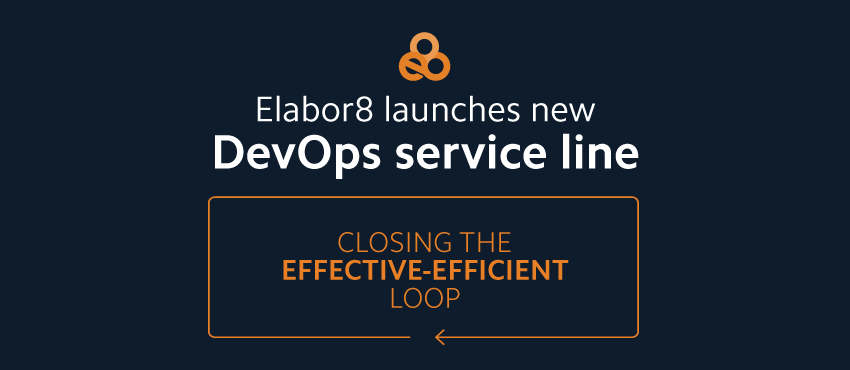We are excited to announce that Elabor8 is now offering expertise in DevOps.
DevOps adoption continues to accelerate across IT organisations of all sizes. According to the 2016 State of DevOps Report companies that demonstrate its success are rewarded with higher levels of performance, revenues and profitability.
To stay ahead of the curve, you need to foster DevOps practices within your teams or risk being left behind. DevOps is about enabling organisations to reduce the cost of delivery by creating an environment where fast, frequent and reliable software releases can happen.
The specific goals include improved deployment frequency, shortened lead times, lower change failure rates, and faster recovery times.
This year’s State of DevOps Report showed how DevOps practices speed up delivery while improving product quality, security and business outcomes – but also organisational culture and employee engagement.
“At Elabor8 our remit is to help organisations get attuned to their clients in order to build them great experiences; to be adaptive to changing market needs; and to create great places to work for their teams.
The pace of innovation in today’s environment is so high that speed and cycle time of product delivery is now seen as a key enabler and that is why we believe DevOps has become such a movement.
We see DevOps as a culture of high-performance rather than simply a process of automation to accelerate software delivery. For us this involves helping organisations find the right thing to do, and then the right way to do it.
For us, DevOps is part of a journey towards total business agility.”
– Paul Velonis, Managing Director, Elabor8
We feel privileged to have attracted two strong technology leaders to Elabor8 and are thrilled to announce the addition of Michael Rembach as well as the promotion of Marcio Sete to Principal Consultant in our Agile Transformation practice focused around DevOps.
Michael joins us from Transport for NSW where, as part of his responsibility for bespoke application development, he was instrumental in establishing a continuous delivery pipeline for on-premises and cloud environments. He also established automated testing processes using BDD and TDD practices as well as “infrastructure as code” disciplines alongside a platform-as-a-service strategy.
Michael is an active leader in the Agile community and a chair for Agile Australia. He brings years of experience working with Agile methodologies, combined with a technical background as a software engineer, a Graduate Diploma in Applied Finance and a Masters of Business (IT Management).
He is both PMI (PMP) and Scrum Master (CSM) certified, and specialises in value-driven practices, strategic advice using contemporary Agile and Lean practices, as well as IT governance framework expertise and transformational change management.
Before landing in Australia, Marcio was a Partner of one of Brazil’s leading DevOps consultancies with customers across the entire country. In his role, Marcio helped dozens of large organisations increase both effectiveness and efficiency in their product development through small and frequent changes.
Marcio has 19 years’ experience in the software industry and for 6 years in a row, Microsoft awarded him as the Most Valuable Professional in Application Lifecycle Management.
Since 2001, Marcio has been deeply involved with communities of practice. Today he is growing the Agile Coach Meetup in Sydney. Marcio is an enthusiast of managing for happiness and a big believer of emergent learning practices.
“Michael is a resounding addition to our Elabor8 team, while we’re excited to have Marcio’s terrific energy in our principal consulting group. Michael and Marcio each bring extensive technical knowledge and immense experience in establishing Agile practices within some of the most complex environments – which is key to our DevOps initiative.
DevOps isn’t a set of recipes for deploying software, or the joining together of two disparate technical disciplines. It’s a philosophy shift that is predicated on the belief that your customer will no longer wait for you to release new features, they’ll go to your competitors because they are doing it faster.
In order to meet this challenge you need a consistent approach to infrastructure setup, automated integration and deployment processes and quality deliverables that are able to hit the production environment whenever the business decides to.
We believe DevOps is 90% culture transformation and 10% software automation.”
– David Landry, Head of Agile Transformation, Elabor8
DevOps is a culture of high-performance; it is not implemented, it’s practised. As with any practice, DevOps is about continuous improvement. Kaizen and Kaikaku. DevOps is commonly associated with Cloud and infrastructure automation. However, there is a huge difference between doing things right – efficiency, and doing the right thing – effectiveness.
We see DevOps as a way to help organisations close the effective-efficient loop.As a cross functional team, Dev and Ops should work with the same source control, script languages and deployment pipelines. They should work under the same processes and be measured by the same KPIs. Otherwise it’s called silo.Organisations spend a lot of energy making sure every “resource” is 100% utilised. Unfortunately, they forget to look at the work itself, and how efficiently it flows through the value chain.
When valuing Flow Efficiency over Resource Efficiency, a whole new game is enabled: high quality, short feedback loops, fast learning and people happiness.To practice DevOps effectively, everything must happen in function of the business demands and constraints. The DevOps movement is disrupting traditional businesses, and changing the main axis of capitalism worldwide.
If you are automating things for the sake of your IT Department, believe us, what you are doing is not DevOps! Companies that are achieving a higher level of organisational culture, product management and engineering practices, are described as Unicorns. They’re used as the industry benchmark of organisational performance.
Rather than trying to mirror them, become a Unicorn!

